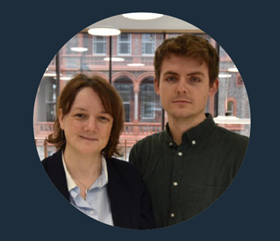Experts from the University of Liverpool and Fletchers Group discuss how the application of explainable AI research and collaborative innovation partnerships are driving forward significant benefits for firms and clients alike. (Sponsored content)
Professor Katie Atkinson – University of Liverpool
At the University of Liverpool, we have been pioneering research to develop AI for law since the 1980s. Our research has developed innovative ways to extract and reason with relevant pieces of knowledge and data contained within complex documents, cases and laws. We have built this legal knowledge into computational models to develop decision-support tools that can enable more consistent and faster decision making in targeted domains than manual human processing delivers.

These tools have been demonstrated to be highly accurate in replicating the actual outcomes of closed court cases in a variety of well-studied areas, reaching 100% success rate in certain scoped legal fields. Our AI tools provide decision support that can advise on outcomes while displaying the arguments and justification process, assisting legal professionals to take informed actions.
One strand of our research is focused on ‘explainable AI’, meaning that the legal judgements our technologies make can be understood by humans. This is very important to foster trust and confidence in the use of AI from legal professionals, their clients and the public.
Our models of legal decision making use numerous AI techniques, including computational models of argument that are able to explain their decisions as a lawyer would. These models can take a set of arguments about a legal case and determine which are the acceptable ones and why, accounting for precedent cases – just as a human does. We are also using machine learning to speed up the legal reasoning process whilst retaining the explainable nature of our AI technologies.
To implement our research into legal practice, we partner with law firms who harness our AI tools to improve their operations and provide better access to justice for their clients. An exemplary case study of how our research is creating impact is our collaborative work with Fletchers.
Noah Milton – AI Project Director at Fletchers Group
With the rising costs of pursuing a claim, there has been a shift across many firms towards high-value work, meaning injured people with lower value claims have fewer solicitors able to support them. Additionally, those experiencing lower financial losses will find it increasingly more difficult to get the support they need – that is, unless we embrace AI.
Fletchers began using AI tools a few years ago. Our partnership with the University of Liverpool developed a machine learning decision support system, which has been used since 2021 to help our specialist lawyers filter out cases with a very low likelihood of being accepted. This helps us speed up the process and focus our highly skilled decision-makers on exploring the most promising enquiries and accepting cases with a higher chance of success.
It is the effective implementation and management of AI in this context which adds the real value. We use AI to save time and direct work towards the right person for the job, but humans still have all the decision-making power. AI simply allows us to consider, and take on, more cases.
We’re investing heavily into building an AI team and will leverage our experience with the University to build tools which add the most value to the industry and open up access to justice for more people.
Highlights so far include the construction of a tool which allows us to harness the power of generative AI to 'converse with' and extract information from a clinical negligence case, and building our own machine learning tool to help process medical records more quickly, making it easier for our specialist nurse team to review large numbers of records across even more cases.
By building a dedicated AI team alongside our highly experienced lawyers, we hope to bring a new approach to injury law. AI presents an exciting opportunity for the industry, where lawyers can free up hours spent on time-consuming, repetitive work, and focus more on bespoke and innovative solutions for the unique circumstances of injured people.
Professor Katie Atkinson
Dean of the School of Electrical Engineering, Electronics and Computer Science
University of Liverpool

University of Liverpool
Liverpool
L69 3BX
katie@liverpool.ac.uk
www.liverpool.ac.uk/AI-in-law






























No comments yet